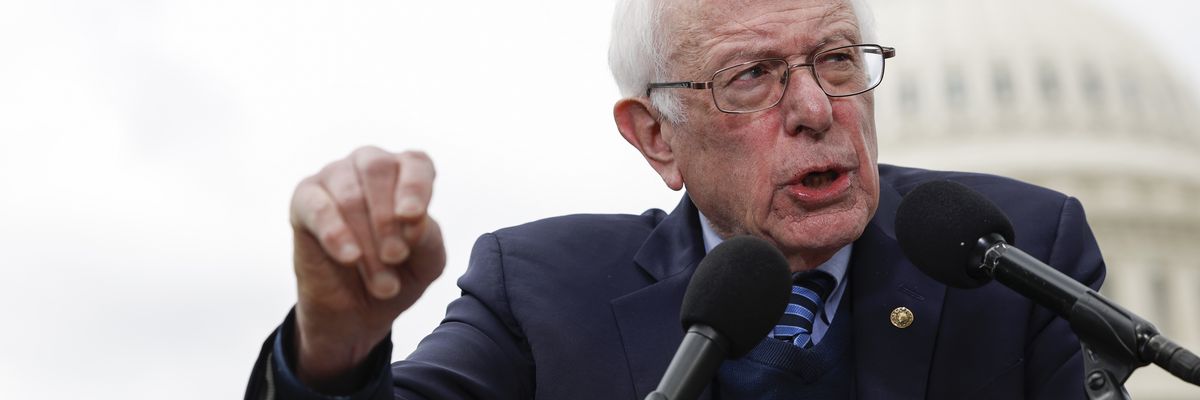U.S. Sen. Bernie Sanders on Monday called for an inspector general investigation into an effort to grant a company tied to an ex-government employee an exclusive patent license for a cancer treatment produced with public resources, as revealed last week by The American Prospect.
Sanders (I-Vt.), who chairs the Senate Health, Education, Labor, and Pensions (HELP) Committee, demanded a probe of the National Institutes of Health (NIH) patent proposal in a letter to Christi Grimm, inspector general of the U.S. Department of Health and Human Services.
"I am growing increasingly alarmed that not only has the NIH abdicated its authority to ensure that the new drugs it helps develop are reasonably priced, it may actually be exceeding its authority to grant monopoly licenses to pharmaceutical companies that charge the American people, by far, the highest prices in the world for prescription drugs," Sanders wrote. "One particularly egregious example has recently been brought to my attention that I believe demands your immediate attention."
Human papillomavirus (HPV) can lead to six types of cancer and is responsible for "virtually all cervical cancer," according to the National Cancer Institute (NCI). Last month, NIH proposed granting Scarlet TCR a patent for a T-cell therapy for HPV, which has already gone through a Phase I trial and has a Phase II trial set to wrap up in 2025.
Prospect executive editor David Dayen spoke with James Love of Knowledge Ecology International, a group that tracks drug patent issues and is formally opposing the proposal for Kingston, New Jersey-based Scarlet TCR, which was incorporated in Delaware earlier this year.
As Dayen detailed last week:
After doing some digging, Love traced Scarlet TCR to a former senior investigator and research scholar for immunology with the National Cancer Institute (a division of the NIH) named Christian Hinrichs, who now works at the Rutgers Cancer Institute of New Jersey. The Rutgers campus in New Brunswick is about 12 miles from Kingston, New Jersey, and the mascot of the university is the Scarlet Knight, which could explain Scarlet TCR. Hinrichs also disclosed a financial relationship with Scarlet TCR at a recent American Association for Cancer Research meeting.
The extent of that relationship is unknown. While Love presumes that Hinrichs is either the creator of Scarlet TCR or one of its principal executives, the NIH would not confirm Hinrichs' role to Love, and offered essentially no information about the company. The Prospect attempted to contact the NIH about Scarlet TCR and Hinrichs as well, and did not receive a response. Hinrichs also did not respond to a request for comment.
Dayen also noted that Sanders' office "did not respond when asked if the Scarlet TCR license would be an issue in congressional hearings."
The reporting was published the same day that Sanders held a confirmation hearing for Dr. Monica Bertagnolli, who currently leads NCI but has been nominated by President Joe Biden to direct NIH. Sanders—who earlier this year held up nominations to pressure the administration to take more action on lowering drug prices—has scheduled a panel vote on Bertagnolli for Wednesday.
Sanders did not directly cite the Prospect in his letter to Grimm, but he wrote that "the apparent abuse of the system by the NIH with respect to the exclusive patent license for this cancer therapy is so egregious that it has been characterized as a 'how-to-become-a-billionaire program run by the NIH,'" which is a remark Love made to Dayen.
"Under the Bayh-Dole Act, the NIH is only supposed to provide an exclusive license to a private company on government-owned inventions when the monopoly would be a 'reasonable and necessary incentive' to help advance the product," Sanders stressed. "There does not appear to be anything reasonable and necessary about granting a monopoly for a treatment that was invented, manufactured, and tested by the NIH, is already in late stage trials, and could potentially enrich a former NIH employee who was one of the major government researchers of this treatment."
"Based on current law and the best interest of U.S. taxpayers who paid for this cancer therapy, it would seem to make more sense for the NIH to offer nonexclusive licenses so that multiple manufacturers can produce this important cancer therapy at reasonable and affordable prices," he asserted. "The NIH should be doing everything within its authority to lower the outrageously high price of prescription drugs. It should not be granting a monopoly on a promising taxpayer-funded therapy that could cost hundreds of thousands of dollars for cancer patients in a way that appears to exceed its statutory authority."




